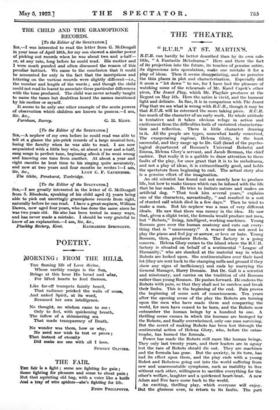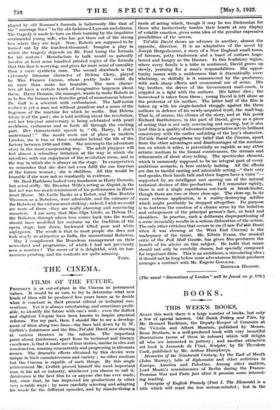THE THEATRE.
R.U.R." AT ST. MARTIN'S.
R.U.R. can hardly be better described than by its own sub- title, "A Fantastic Melodrama." Here and there the fact of its projection into the future, its touches of genuine satire, its digressions into speculation, make one mistake it for a play of ideas. Then it seems disappointing, and we perceive the thin places in plot and characterization. Especially did it seem a "let down" to me, for I have had the pleasure of watching some of the rehearsals of Mr. Karel Capek's other piece, The Insect Play, which Mr. Playfair produces at the Regent on May 5th. Here the satire is vivid, and the humour light and delicate. In fine, it is in comparison with The Insect Play that we see what is wrong with R.U.R., though it may be that R.U.R. will be esteemed the more taking piece. R.U.R. has much of the character of an early work. Its whole attitude is tentative and it takes obvious refuge in action and excitement from the difficulties both of sustained characteriza- tion and reflection. There is little character drawing in it. All the people are types, somewhat hazily conceived. The exasperating ingenue, Helena Glory, is the least successful, and they range up to Dr. Gall (head of the psycho- logical department of Rossum's Universal Robots) and Emma, Helena Glory's servant, and Jacob Berman, the chief cashier. But really it is a quibble to draw attention to these faults of the play, for once grant that it is to be melodrama, and not a play of ideas, it is extraordinarily good, and holds the spectators from beginning to end. The actual story also is a genuine effort of the imagination.
An old scientist has found out not merely how to produce life, but how to make tissues which can be infused with the life that he has made. He tries to imitate nature and makes an artificial dog. "That took him several years," explains one of the characters, sarcastically, "and resulted in a sort of stunted calf which died in a few days." Then he tried to make a man. But his nephew was a man of very different ideals. He saw that there was money in the idea. He saw that, given a slight twist, the formula would produce not men, but "Robots," living, intelligent, working machines. Young Rossum goes over the human anatomy and cuts out every- thing that is "unnecessary." A weaver does not need to play the piano and feel joy or sorrow, or love or hate. Young Rossum, then, produces Robots. The factory is a going concern. Helena Glory comes to the island where the R.U.R. factory is situated on behalf of a sentimental "League of Humanity," who are shocked at the material way in which Robots are looked upon. She sentimentalizes over their hard lot (they are sent back to the stamping mills and ground if they show any signs of inefficiency) and ends by marrying the General Manager, Harry Domain. But Dr. Gall is a scientist and missionary, and carries on the tradition of old Rossum rather than young Rossum. He pushes forward. He endows the Robots with pain, so that they shall not be careless and break their limbs. This is the beginning of the end. Pain proves the beginning of some sort of consciousness. Ten years after the opening scene of the play the Robots are turning upon the men who have made them and conquering the world, for men have ceased to be born, and the Robots now outnumber the human beings by a hundred to one. A thrilling scene ensues in which the humans are besieged by the Robots, and finally overwhelmed, only one man surviving. But the secret of making Robots has been lost through the sentimental action of Helena Glory, who, before the catas- trophe, has burned the formula.
Power has made the Robots still more like human beings. They only last twenty years, and their leaders are in agony lest the race of Robots should die out. They are machines and the formula has gone. But the anxiety, in its turn, has had its effect upon them, and the play ends with a young Robot and Robotess going out into the world suffering from new and unaccountable symptoms, such as inability to live without each other, willingness to sacrifice everything for the other's welfare, laughter and a quickened heart-beat. A new Adam and Eve have come back to the world.
An exciting, thrilling play, which everyone will enjoy. But the glamour over, to return to its faults. The part
played by old Rossum's formula is ludicrously like that of the "marriage lines " in the old-fashioned Lyceum melodrama. The tragedy is made to turn on their burning by the impulsive sentimental young wife, who has got them out of the strong box where they are kept. Now, Robots are supposed to be turned out by the hundred-thousand. Imagine a play in which the tragedy depends on Mr. Ford losing the formula for his motors ! Manufacture in bulk would so patently involve at least some hundred printed copies of the formula that this flaw is worrying, and gives far more sense of unreality than a mere synthetic man. The second drawback is the extremely tiresome character of Helena Glory, played by Miss Frances Carson, whose pretty looks could do no more than make her bearable. The men charac- ters all have a certain touch of imaginative largeness about them. Harry Domain, the manager, wants to make Robots so as to free the human race from the grind of monotonous labour. Dr. Gall is a scientist with enthusiasms. The half-comic cashier is yet a man not without grandeur and a sense of the hugeness of the machine for which he works. But Helena Glory is of the past ; she is told nothing about the revolution, and her ten-year anniversary is being celebrated with pearl necklaces, cyclamens and so forth all through the exciting part. Her characteristic speech is, "Oh, Harry, I don't understand ! " She would seem out of place in modern London, she is two or three centuries behind the life of the factory between 1950 and 1960. She interrupts the adventure story in the most exasperating way. The adult playgoer will feel almost a schoolboy irritation at the way in which she interferes with our enjoyment of the revolution scene, and in the way in which she is always on the stage. In exasperation we remember that she does not even fulfal the one function of the harem woman ; 'she is -childless. All this would be bearable if she were not so constantly in evidence.
Mr. Basil Rathbone looked very handsome as Harry Domain,
but acted stiffly. Mr. Brember Wills's acting as Alquist, in the last act was too much reminiscent of his performance in Heart- break House. Mr. Leslie Banks as a Robot, and Miss Beatrix Thomson ELS a Robotess, were admirable, and the entrance of the Robots at the end was most striking ; indeed,! wish we could see more of them—they are really alarming and convincing monsters. I am sorry that Miss Olga Lindo, as Helena II., the Robotess through whom love comes back into the world, should have modelled her costume on the tradition of the
opera stage, hair down, backward tilted pose and white nightgown. The result is that to most people she does not look nearly so attractive as Sulla, the unemotional Robotess.
May I compliment the Reandcan management on their news-sheet and programme, of which I had not previously seen a number ? The cover of it is delightful, with its har- monious printing, and the contents are quite amusing.
TARN.















































 Previous page
Previous page